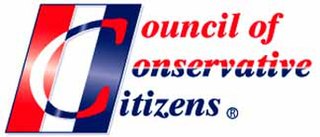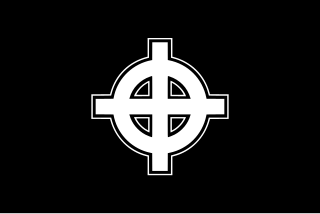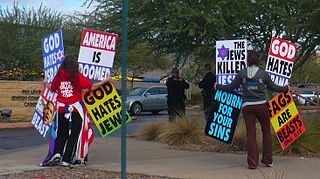Related Research Articles
A hate crime is a prejudice-motivated crime, which occurs when a perpetrator targets a victim because of their physical appearance or perceived membership of a certain social group.
Lesbian, gay, bisexual, transgender, queer, intersex, and asexual (LGBTQIA+) people frequently experience violence directed toward their sexuality, gender identity, or gender expression. This violence may be enacted by the state, as in laws prescribing punishment for homosexual acts, or by individuals. It may be psychological or physical and motivated by biphobia, gayphobia, homophobia, lesbophobia, and transphobia. Influencing factors may be cultural, religious, or political mores and biases.

The Council of Conservative Citizens is an American white supremacist organization. Founded in 1985, it advocates white nationalism, and supports some paleoconservative causes. In the organization's statement of principles, it states that they "oppose all efforts to mix the races of mankind".

A hate group is a social group that advocates and practices hatred, hostility, or violence towards members of a race, ethnicity, nation, religion, gender, gender identity, sexual orientation, or any other designated sector of society. According to the United States Federal Bureau of Investigation (FBI), a hate group's "primary purpose is to promote animosity, hostility, and malice against persons belonging to a race, religion, disability, sexual orientation, or ethnicity/national origin which differs from that of the members of the organization."

Violence against transgender people includes emotional, physical, sexual, or verbal violence. The term has also been applied to hate speech directed at transgender people and at depictions of transgender people in the media that reinforce negative stereotypes about them. Trans and non-binary gender adolescents can experience bashing in the form of bullying and harassment. When compared to their cisgender peers, trans and non-binary gender youth are at increased risk for victimisation, which has been shown to increase their risk of substance abuse.
Hate crime laws in the United States are state and federal laws intended to protect against hate crimes. While state laws vary, current statutes permit federal prosecution of hate crimes committed on the basis of a person's characteristics of race, religion, ethnicity, disability, nationality, gender, sexual orientation, and/or gender identity. The U.S. Department of Justice (DOJ), Federal Bureau of Investigation (FBI), and campus police departments are required to collect and publish hate crime statistics.
The Chicago Lawyers' Committee for Civil Rights is a consortium of American law firms in Chicago that provides legal services in civil rights cases
An incident response team (IRT) or emergency response team (ERT) is a group of people who prepare for and respond to an emergency, such as a natural disaster or an interruption of business operations. Incident response teams are common in public service organizations as well as in other organizations, either military or specialty. This team is generally composed of specific members designated before an incident occurs, although under certain circumstances the team may be an ad hoc group of willing volunteers.

Ukraine is a multi-ethnic country that was formerly part of the Soviet Union. Valeriy Govgalenko argues that racism and ethnic discrimination has arguably been a largely fringe issue in the past, but has had a climb in social influence due to ultra-nationalist parties gaining attention in recent years. There have been recorded incidents of violence where the victim's race is widely thought to have played a role, these incidents receive extensive media coverage and are usually condemned by all mainstream political forces. Human Rights Watch reported that "racism and xenophobia remain entrenched problems in Ukraine". In 2012 the European Commission against Racism and Intolerance (ECRI) reported that "tolerance towards Jews, Russians and Romani appears to have significantly declined in Ukraine since 2000 and prejudices are also reflected in daily life against other groups, who experience problems in accessing goods and services". From 2006 to 2008, 184 attacks and 12 racially motivated murders took place. In 2009, no such murders were recorded, but 40 racial incidents of violence were reported. It is worth considering that, according to Alexander Feldman, president of the Association of National and Cultural Unions of Ukraine, "People attacked on racial grounds do not report the incidents to the police and police often fail to classify such attacks as racially motivated and often write them off as domestic offence or hooliganism".

Antisemitism has existed for centuries in the United States. Most Jewish community relations agencies in the United States draw distinctions between antisemitism, which is measured in terms of attitudes and behaviors, and the security and status of American Jews, which are both measured by the occurrence of specific incidents. FBI data shows that in every year since 1991, Jews were the most frequent victims of religiously motivated hate crimes, according to a report which was published by the Anti-Defamation League in 2019. Evidence suggests that the true number of hate crimes against Jews is underreported, as is the case for many other targeted groups. In an attempt to combat anti-Semitism, the Biden administration launched the United States’ first-ever comprehensive U.S. National Strategy to Counter Antisemitism on May 25, 2023.
Not In Our Town is a project that uses documentary film, new media, and organizing to stop hate, address bullying, and build safe, inclusive communities. Not In Our Town is the primary program of The Working Group, an Oakland, California-based nonprofit media production company founded in 1988.
The Anchorage paintball attacks of January 14, 2001 were a series of pre-meditated and racially motivated drive-by shootings targeted at Alaska Natives in downtown Anchorage that night. These attacks, described by the news media and by Alaska legislators as hate crimes, and by Anchorage mayor George Wuerch as "racism at its worst", sparked a broader debate about race relations in Alaska.
Antisemitism in Canada is the manifestation of hostility, prejudice or discrimination against the Canadian Jewish people or Judaism as a religious, ethnic or racial group. This form of racism has affected Jews since Canada's Jewish community was established in the 18th century.
Disability hate crime is a form of hate crime involving the use of violence against people with disabilities. This is not only violence in a physical sense, but also includes other hostile acts, such as the repeated blocking of disabled access and verbal abuse. These hate crimes are associated with prejudice against a disability, or a denial of equal rights for disabled people. It is viewed politically as an extreme form of ableism, or disablism. This phenomenon can take many forms, from verbal abuse and intimidatory behaviour to vandalism, assault, or even murder. Although data are limited studies appear to show that verbal abuse and harassment are the most common. Disability hate crimes may take the form of one-off incidents, or may represent systematic abuse which continues over periods of weeks, months, or even years. Disabled parking places, wheelchair access areas and other facilities are frequently a locus for disability hate. Instead of seeing access areas as essential for equity, they are seen instead as 'special treatment', unjustifiable by status, and so a 'reason' for acting aggressively. Denial of access thus demonstrates a prejudice against equal rights for disabled people; such actions risk actual bodily harm as well as limiting personal freedom.

In the United States, lesbian, gay, bisexual, and transgender (LGBT) people have a long history, including vibrant subcultures and advocacy battles for social and religious acceptance and legal rights.
"Knockout game" is one of the names given in the United States for assaults in which a person attempts to make an unsuspecting victim lose consciousness with a single sucker punch. The assaults have similarities to the happy slapping trend seen in Europe, in which camera phones are used to record assaults. Other names given to assaults of this type include "knockout", "knockout king", "point 'em out, knock 'em out", and "polar-bearing" or "polar-bear hunting".
The White Student Union (WSU) was an unaffiliated white supremacist organization founded in Towson, Maryland by Matthew Heimbach, at the time a Towson University student. The group advocated for what it sees as the interests of "persons of European heritage". It has been listed as a hate group by the Southern Poverty Law Center and the Anti-Defamation League. The organization rejected this label, stating in a blog post that "We do not hate any other race and we do not wish anyone harm". In May 2013 Heimbach said that the group would merge with the Traditionalist Youth Network which Heimbach described as an effort to build "a wide coalition of Kinist, social conservatives, Traditionalist Christians, believers in Right-wing politics, and other factions of the pro-white movement."
Islamophobia in Canada refers to a set of discourses, behaviours and structures which express feelings of anxiety, fear, hostility and rejection towards Islam or Muslims in Canada.
A mass stabbing is a single incident in which multiple victims are harmed or killed in a knife-enabled crime. In such attacks, sharp objects are thrust at the victim, piercing through the skin and harming the victim. Examples of sharp instruments used in mass stabbings may include kitchen knives, utility knives, sheath knives, scissors, katanas, hammers, screwdrivers, icepicks, bayonets, axes, machetes and glass bottles. Knife crime poses security threats to many countries around the world.

The Rally Against Hate was a large anti-racism demonstration that took place in Columbus Park, New York, on March 21, 2021.
References
- ↑ Responding to Hate Crimes and Bias-Motivated Incidents on College/University Campuses. Community Relations Service. May 2000. p. 19.
- ↑ "Identifying And Responding To Bias Incidents". Teaching Tolerance. Southern Poverty Law Center. 16 July 2009. Retrieved March 22, 2015.
- 1 2 3 "Hate Crimes and Bias Incidents". Responding to Bigotry and Intergroup Strife on Campus: Guide for College and University Administrators. Anti-Defamation League. 2008. Archived from the original on March 26, 2015. Retrieved March 22, 2015.
- ↑ Wessler, Stephen; Moss, Margaret (October 2001). Hate Crimes on Campus: The Problem and Efforts to Confront It. Bureau of Justice Assistance. p. 11.
- ↑ Community Relations Service. pg. 19.
- ↑ Community Relations Service. pg. 13.
- ↑ Wessler & Moss. pp. 11–13.
- ↑ "What are hate incidents and hate crime?". Adviceguide. Citizens Advice. Retrieved March 22, 2015.